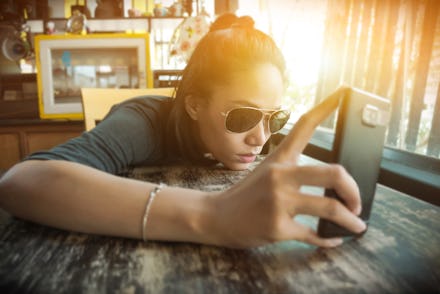What to know about the celebrity lookalike app, Gradient

Step aside, FaceApp — there's a new trending app in town. A photo editing app called Gradient Photo Editor has been making waves on Instagram thanks to a new feature that is "powered by artificial intelligence," according to the developers. Among other editing features, it can take your selfie and compare it to an archive of celebrity photos, where it will scan features until it finds which celebrity looks closest to you. Then, it gives a gradient-like result in return as it transforms your face into the celebrity's face within four images. It's like an Animorphs book cover, but without the body horror of shape-shifting into a cool animal.
The app's visibility has been boosted by paid (and unpaid) posts by celebs like the Kardashians and Scott Disick, who ended up with with results like Cher (Kim), Anna Nicole Smith (Khloe), and... himself (Scott Disick). Other Instagram users have also dived in with some serious and humorous results.
It's all fun and games, but it's no surprise that the app is reminding some people of their FaceApp concerns. While everyone else was using FaceApp filters to see what they'd look like when they're old, others were pointing out that the app could be doing anything with the facial data you upload. With the growing concern over the use of images in deepfake videos, people are becoming more wary over what these apps do.
Gradient is no exception to the suspicion. The app is made by a developer called 'Ticket to the Moon, Inc.,' a relatively unknown company with little to no information about it on its website or online. The app's terms of use discloses the company's address at a location in Delaware, but a quick Google search of that address brings up an international investment firm called Meihua Capital Partners LLC instead of Ticket to the Moon. Not much else is mentioned on either the Gradient or Meihua webpage, so it's unclear how closely the two businesses are related. The terms of use also state that the company won't claim any images as its own, but it does give itself a pass to use your content freely to provide its services (which includes any other apps made by the same developers).
The company's privacy policy also lays out how your data will be used and collected. They claim any 'face data' will not be stored, shared, or transferred off your device. Nor will it be sold to other services or advertising companies. However, some data will be collected to "provide, improve, test, and monitor the effectiveness of Gradient" and "develop and test new products and features." Since the app uses A.I. to get your celeb match, it likely needs that data to continue 'learning' how to refine its results.
The privacy policy admits that some data might be shared among other businesses that are "legally part of the same group of companies where Ticket to the Moon, Inc. is a part of" or that "become part of the group" in the future — but there is no list of who or what those businesses are.
Thanks to the GDPR, European users have the right to request for the deletion of their information and restrict or stop what the company does with their data. You might not be able to use the app as well once your data is deleted, but with a pricey monthly subscription cost of $19.99 — after a short, but free, three-day trial — you might not want to use it anymore anyway.